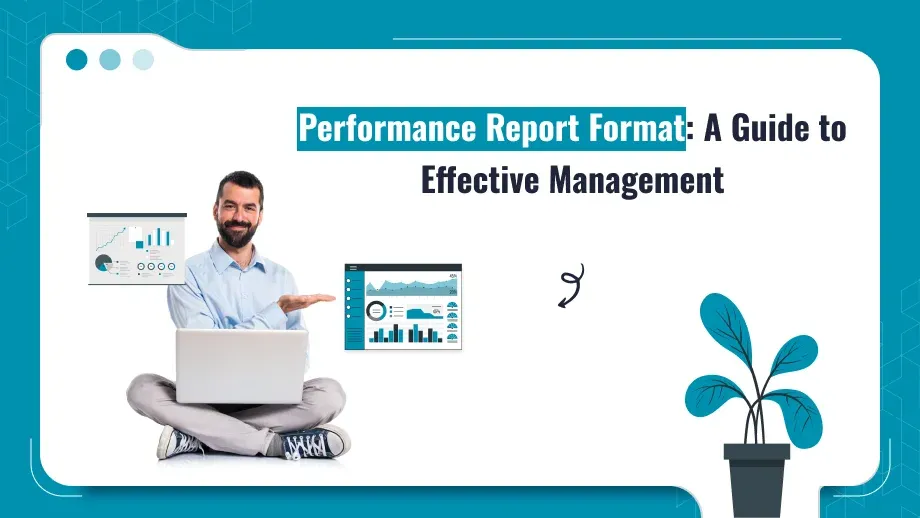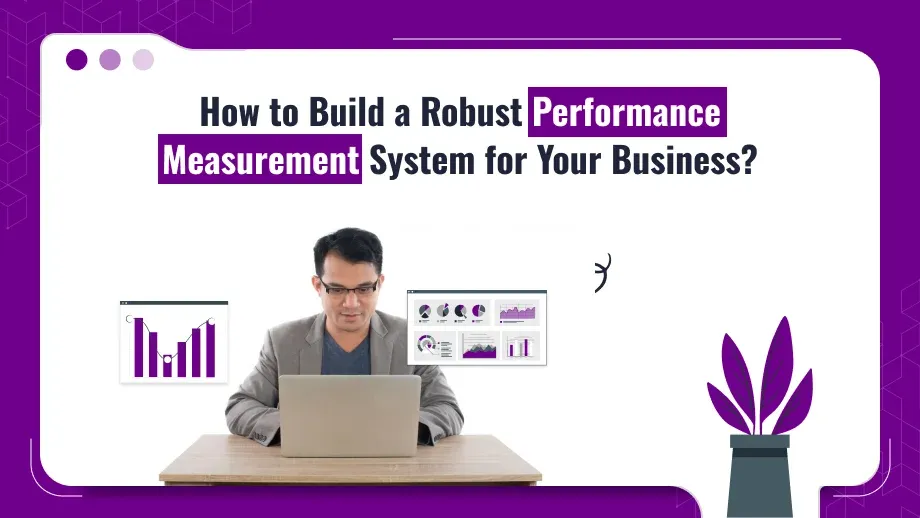
In today’s fast-changing market, every business has to have a properly-planned performance management system to make sure that employee performance matches with business objectives. One of the key instruments in every performance management system is a clear reporting format for performance. It provides a method to evaluate, monitor, as well as improve team performances, providing organizations with the foundation of data to improve performance report format and grow.
This article will guide you through the essential factors to consider when designing the format for a performance report, provide essential performance management strategies and guide you on how you can implement a reliable process for performance appraisal system. In the end you’ll know the value of performance reports, and what they can do to the success of your business.
1. Introduction: Why Performance Management Matters
Every business depends on its employees to complete the tasks that are essential to business success. Without proper direction regularly scheduled evaluations, as well as evaluations, employees might not be able to perform at their best. This is where management of performance can help.
Performance management is a comprehensive strategy to make sure employees work at their highest. It involves setting objectives as well as monitoring progress, offering constant feedback, as well as providing education and training. To effectively monitor employees’ performance, businesses require the right structure. That’s why forms for performance report formats as well as performance appraisal systems play a vital part.
If you have a properly structured performance report by having a structured performance report in place, you will be able to:
- Recognize strengths and areas for improvements.
- Monitor performance in relation to objectives.
- Assist employees in aligning their individual goals with the company’s goals.
- Provide clear and relevant feedback that is meaningful and transparent.
A properly-planned performance management system increases employee satisfaction, retention and overall productivity.
2. Essential Elements of the Performance Report format
A good performance report should be thorough, but concise enough to give actionable insight. The performance report format must evaluate the employee’s performance during an extended period of time, typically every quarter or year. The following are some of the most important components that should be covered when preparing a report on performance:
1. Employee Information
The section contains basic information like:
- Name of the employee
- Job title
- Department
- The manager who reports to the reporting
- Review period
2. Performance Objectives
Here you should list the goals of your employee that you determined for the time period during which they were reviewed. They should be quantifiable precise, concrete, and in line to the company’s overall goals.
3. Key Performance Indicators (KPIs)
KPIs are metrics that employees use to determine whether an employee has met their targets. The types of KPIs that can be used are goals for sales, feedback, satisfaction scores, project completion timeframes, etc.
4. Performance Summary
The section must include an overview of the employee’s achievements with a focus on areas of strength and achievements that are specific to the employee. It can also highlight the areas in need of improvement.
5. Manager’s Feedback
The report manager is able to provide further feedback, such as evaluations of soft skills such as collaboration, communication, and the ability to solve problems.
6. Employee’s Self-Assessment
The ability of employees to give their own feedback is a way to ensure accountability and helps employees take participation in their own professional advancement.
7. Development Opportunities
Determine areas where growth is needed and suggest particular training or development plans which can help employees to improve their performance over time.
8. Future Goals
Create New goals for the coming review time. The goals are focused, measurable, achievable, and SMART (Specific goals, Measurable, Attainable And Time-bound).
Unlock the potential of your team’s performance with our expertly crafted performance report format!
Start creating impactful reports today to drive success and boost productivity.
9. Overall Rating
Final rating or grade that summarizes the performance of an employee based on the criteria mentioned above. It could be an arbitrary scale, or just more descriptive (e.g., “Exceeds Expectations,” “Meets Expectations,” and so on. ).
3. Performance Management Strategies for Success
The concept of performance management goes beyond concerned with filling in reports, but creating continuous improvement, and increasing the engagement of employees. There are many important performance management strategies you can implement to ensure that your performance management program is effective.
Goal Alignment
Make sure that the goals of every employee match with the organisation’s goals and objectives. If employees know the importance of their work to the larger goals of the company They are motivated to do their best.
Continuous Feedback
Instead of waiting until annual appraisals, consider implementing regularly scheduled feedback loops. Feedback loops that are continuous allow for faster changes to course, and helps keep workers engaged.
Employee Development
Develop a focus on performance management as a procedure. Inspire learning and development through mentorship, training and career pathways in the process of reviewing performance.
Employee Engagement
Participate employees as part of the process of managing their performance. This will ensure that they are dedicated to their own personal development, and will be more likely be responsive to feedback positively.
Recognition and Rewards
Integrate rewards and recognition in your performance management strategies. Recognition of top performers motivates them to keep their high-performance and inspires others to do better.
The strategies for managing performance help to create an environment of high-performance, where employees are encouraged by the desire to help contribute to an organization’s achievement.
4. Creating a Performance Report Format
An organized format for performance report format will ensure that the evaluations are uniform within the business. These are the steps for creating one:
Step 1: Define Your Objectives
What do you want to accomplish through the performance report format you produce? It doesn’t matter if it’s improving efficiency and communication or finding areas of development with a specific goal, having a clearly defined objective can guide the design of your report.
Step 2: Identify Key Metrics (KPIs)
Select performance measures that relate to the job and duties. A salesperson, for instance, might be evaluated according to revenues from sales, whereas an agent for customer service may be evaluated based on satisfaction ratings.
Step 3: Set a Clear Rating Scale
A clearly defined rating scale can help to eliminate ambiguity when evaluating. If you are using a 1-5 numerical scale or descriptive ratings ensure that the standards are clear.
Step 4: Include Both Qualitative and Quantitative Data
Although KPIs give quantitative statistics but it’s also important to incorporate qualitative feedback. This provides an accurate overview of an employee’s performance and includes factors such as cooperation, teamwork as well as attitude.
Step 5: Allow Employee Feedback
Add a space for employees to provide feedback, or to provide themselves with a self-assessment. The performance review becomes an open dialogue, resulting in more buy-in from the employees.
5. Performance Appraisal Systems: Role and Importance
It is a performance appraisal system can be described as a formal way to evaluate employee performance for the course of a specified time. It is an integral part of the management of performance. It often is tied into the decisions regarding the promotion process, salary adjustment and development of career.
Performance appraisal system are:
- Assessing Competency Levels gives a systematic way to determine the competence and skills levels of employees.
- Facilitating Communication: Evaluations provide channels for interaction between managers and employees giving them the chance to receive and give feedback.
- Making Goals for the Future The appraisal process is not only to evaluate past performance. They should also set objectives for the future and to ensure that employees follow a clear direction for their development.
The implementation of a formal performance appraisal process also aids in creating an environment in which employees understand what’s expected of them, and they are recognized for their work.
6. Integrating a Performance Management System for Continuous Improvement
A performance appraisal system is an online solution created to aid businesses with streamlining their process of managing their performance report format. There are several methods to integrate a system into your business that can assist:
Real-time Feedback
By implementing a performance management program that provides feedback to managers on a regular basis, which ensures that employees’ performance is constantly improving rather than having to wait for a review every year.
Automated Reports
An effective system will make it easier to create performance report format which can save managers time and manually-based tasks. The automation will also guarantee that the reports all follow the same structure and standards to ensure the consistency of reports.
Data-Driven Insights
Performance management systems collect information over time and provides useful insights into employee performance changes. These data are used to inform decision-making regarding the granting of promotions, firings, or group restructuring.
Goal Tracking
The systems enable employees and managers to monitor their goals and performance throughout the period of review to ensure that their performance remains on the right track.
Through investing in a performance management program, companies can guarantee continuous development of their employees and growth over time. This will boost long-term profitability as well as productivity.
Conclusion
An effective performance report format is much more than an evaluation tool, it’s an essential element of company success. Utilizing strategies to manage performance by aligning goals as well as implementing a well-organized evaluation system for performance report format, businesses are able to create a highly-performing workforce that is aligned with the vision of the business and mission.
Through focusing on constant feedback, goal alignment and the development of their employees, organizations are able to create a culture of performance report format that does more than boost the productivity of employees but also helps drive the growth of their organization. Through data-driven performance management enable companies to make educated decisions, maximize the allocation of resources, and make sure that they’re on the track to enduring growth.
Utilizing the best techniques and tools for performance report format can not just improve employees’ performance, but will also create an efficient, happy and enthusiastic workforce capable of meeting the needs of today’s competitive environment and propel the company to the next level.







